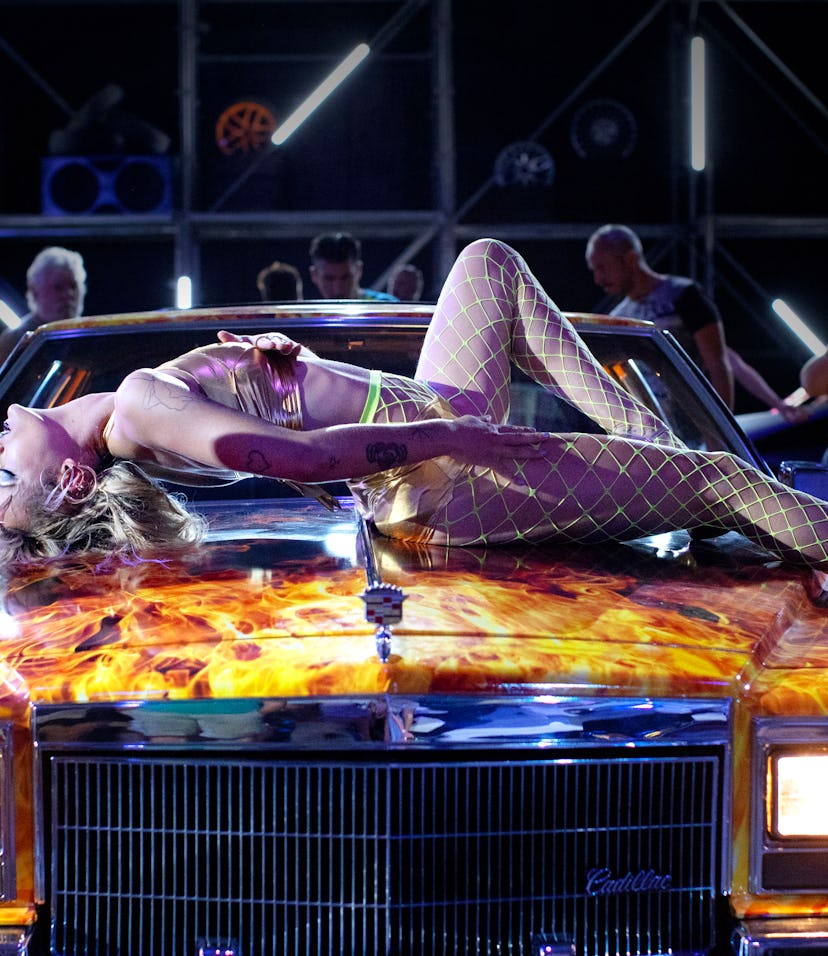Body Horror

A “Body Horror” Film That Captures The True Weirdness Of Pregnancy
“I’d look at my swollen belly and wonder if anybody would ever acknowledge the truth: that something really weird was going on in there. Titane, in all its gory glory, seems to understand this.”
[The following contains some mild spoilers, but honestly this movie is so wild it'd be hard to spoil.]
I’d prepared myself for a strange and shocking ride going into Titane, the ultraviolent French “body horror” film about Alexia, a female serial killer impregnated by a car. What I wasn't prepared for was just how familiar Alexia’s pregnancy would feel to me. In real life, I often found pregnancy as eerie as it was heartwarming.
Directed by Julia Ducournau, who became the second-ever woman to win the Palme d’Or with this film, Titane defies easy summary. I’ll try. We don’t know much about its antiheroine, Alexia, played to ballistic perfection by newcomer Agathe Rousselle, but we do know that a childhood car accident left her with a plate of the titular metal in her skull, and we can imagine the kind of schoolyard harassment she may have endured due to the large, starkly bald scar curling around her ear. We know that her father is cold, and we know that, as a car-show dancer, gyrating against a vehicle in fishnets and a bikini, she’s clearly more into cars than people. Who can blame her?
The human touch seems repugnant enough to Alexia to trigger violence, and after a grisly — and when I say “grisly,” I mean “watch on an empty stomach” — murder spree, she takes shelter in the form of a stolen identity, Adrien, who is the missing son of a fire chief, Vincent, played by the heartbreaking Vincent Lindon.
Wacky as it sounds on paper, Alexia’s cyborg pregnancy requires less suspension of disbelief than the other plot points.
One more key detail: early on, when Alexia’s lust for metal and murder converge explosively, she has sex with a car, and the car gets her pregnant. What? Yes, I said she f*cks a car. Just go with it.
Wacky as it sounds on paper, Alexia’s cyborg pregnancy requires less suspension of disbelief than the other plot points, at least for me. Even though my own baby was wholly human, it didn’t always feel that way. Despite medical evidence to the contrary, something about gestating another human from a microscopic speck struck me as science fiction on some days. On other days, straight-up horror.
Pregnancy, a process which involves the creation of life, a process in which the pregnant person assumes a degree of risk up to and including their own death, has always felt like a much wilder and more dangerous endeavor than we collectively give it credit for. Somehow we’ve created a culture that broadly agrees to gloss right over its difficulties with the Etsy monthly milestone kits and the fruit-of-the-week measurements and steady stream of effervescent congratulations. When I was pregnant with my daughter, I’d look at my swollen belly and wonder if anybody would ever acknowledge the truth, that something really weird was going on in there. Titane, in all its gory glory, seems to understand this.
As in real life, strange things transpire as the baby grows.
Played for horror, every stage of Alexia’s pregnant suffering feels painfully true. We watch her try and fail to get rid of the pregnancy herself with a sharp tool, an excruciating scene which augurs the anti-choice reality in which our reproductive capacities make prisons of our bodies. As in real life, strange things transpire as the baby grows. Alexia’s body rumbles and expands. Her stretching skin becomes torturously itchy. Mysterious fluids leak. On top of everything, she must conceal and repress it all to maintain her con. Disappointingly, at no point in her pregnancy does Alexia check online to see if her fetus is the size of a mango or an apple, but her difficulties will ring familiar if your body has carried a child.
The body: It’s on everyone’s mind these days. Although the body horror genre is nothing new, it feels — thanks to an ongoing global reckoning surrounding race, gender, and sexuality — like we’re portraying our bodies more vividly and honestly and in a wider variety of voices than ever. We’ve come a long way from the 1950s, when CBS executives forbid the use of the word “pregnant” to describe Lucille Ball’s condition on I Love Lucy, which tucked its married leads into two twin beds.
In Titane, too, bodies star. A squad of firemen cut loose via writhing, shirtless dance parties. Vincent clings to his fading masculinity via steroid injections. Blood sprays. Alexia’s body — sticking with the language of vehicles — is the axis on which the whole thing rolls. Part human part machine, a site of pleasure and pain throughout the story, she serves as both a vessel for her car baby, and also a narrative vessel for our sympathy. As Ducournau told the Los Angeles Times, “if the audience can’t relate morally to her then I’m going to make them relate to her body. And her body was my entry point to create an umbilical cord between the audience and her.”
It works. Thanks to director Julia Ducournau’s artistry, the outlandish premise makes some kind of twisted sense. She delivers something unique: a world of pain and feeling, a spectacle of fire and metal and blood and bodies that’s as smart as it is visceral. Titane acknowledges the terror and vulnerability of pregnancy that I always sensed, suppressed beneath the cutesy trappings and hollow frills of “maternity.” The movie reminds me of pregnancy itself, the real thing: scary, nauseating and not for the faint of heart, but — once you make it through — utterly rewarding.
This article was originally published on